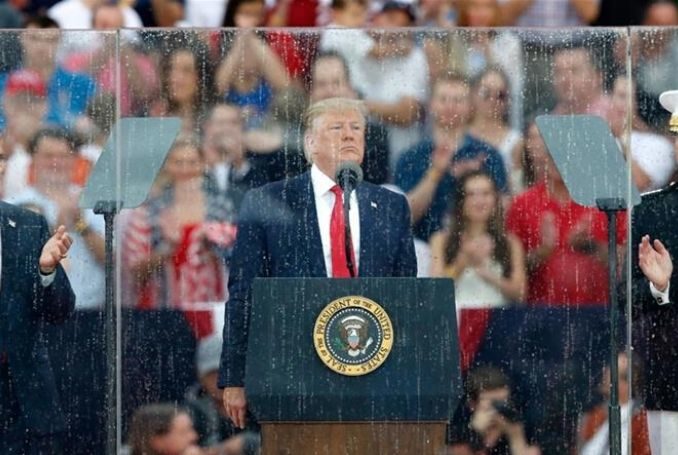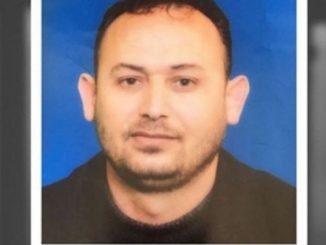
By Benay Blend
On Friday, July 3, 2020, Donald Trump used the occasion of Independence day to deliver what Annie Karnie called “a dark and divisive” speech before a crowded audience at He Sápa (the Lakota name for the Black Hills), also known as Mount Rushmore, South Dakota. Reaching out to his far-right base, Trump cast his re-election campaign as a war against a “new far-left fascism,” never mind that the description is an oxymoron.
“Our nation is witnessing a merciless campaign to wipe out our history, defame our heroes, erase our values and indoctrinate our children,” said Donald Trump, apparently using “our” to denote his mostly white, right-wing audience few of whom were wearing masks. “Angry mobs are trying to tear down statues of our founders, deface our most sacred memorials and unleash a wave of violent crime in our cities.”
“Throughout his presidency,” writes Karnie, “Mr. Trump has tried to bend events to his will, often using social media to drive home his alternate version of reality and, thanks to the power of repetition” he quite often has succeeded. More than just a campaign rally, Trump’s use of spectacle on July 3 holds much in common with filmmaker Leni Reifenstahl’s 1935 “The Triumph of the Will,” a propaganda film from Nazi Germany.
The most “striking aspect” of the film, writes critic James Cullen, is the way that propaganda becomes normalized as truth, a tactic that Netanyahu as perfected to maintain his position in Israel. Both relying on their stature as “strong men” leaders, Trump and Netanyahu manipulate their audience by presenting outright lies as truth, all in a current of nationalism and racism that, at least in the United States, polarizes the country in Trump’s favor.
On Friday night there was the requisite drama of military flyovers, lighting that enhanced Trump as a figure of great importance, and Iron Eagles on both sides of the podium. As Abby Zimet notes, the “dog whistle” became a “fog horn” with Trump’s appropriation of this symbol (minus the swastika) of the Nazi Party.
There is more. Joseph Goebbels, Nazi Minister of propaganda, said the following:
“If you tell a lie big enough and keep repeating it, people will eventually come to believe it. The lie can be maintained only for such time as the state can shield the people from the political, economic and/or military consequences of the lie. It thus becomes vitally important for the state to use all of its powers to repress dissent, for the truth is the mortal enemy of the lie, and thus by extension, the truth is the greatest enemy of the state.”
Both Trump and Netanyahu have done just that. What connects them more than anything, perhaps, is that each holds power on Indigenous stolen land. Since the creation of the State of Israel in 1948, successful governments have attempted to erase Palestinian people from their connection to the land. For much longer, over 500 years, in fact, Euro-Americans have done the same.
“In every age, there have always been those who seek to lie about the past in order to gain power in the present,” Trump warned on July 3rd. “Those that are lying about our history, those who want us to be ashamed of who we are, are not interested in justice or in healing.”
Neither apparently is Mr. Trump, for his speech was in front of Mount Rushmore, named for a gold speculator and New York attorney, designed by a supporter of the Ku Klux Klan. Moreover, leaders of Indigenous nations of the United States ordered him not to come to an area already suffering from Covid-19.
Appearing on Democracy Now, Nick Estes, a citizen of the Lower Brule Sioux Tribe and assistant professor of American studies at the University of New Mexico, explained that the Black Hills, known to the Lakota as He Sápa, is the “center” of the “universe” for Lakota people, perhaps much like Jerusalem is to Palestinians. Moreover, more than 50 different Indigenous nations have origin stories or spiritual connections to the Black Hills.
After the 1868 Fort Laramie Treaty, the Lakota, Cheyenne and Arapaho people became caretakers of that land. When Trump ignored the tribes’ request not to come it was a clear violation of sovereignty. It was also a move likely to worsen the Covid-19 pandemic that is already ravaging the people.
In the words of NDN president Nick Tilsen:
“This is an act of violence and aggression against us, and it’s also pushing this falsehood narrative about American democracy, when we actually really should be uplifting the truths of what happened throughout history and how those truths are directly connected to the disparities that exist today in society amongst Indigenous people.”
In “The Need for a Palestinian History from Below,” Ramzy Baroud clarifies how “The Great Man Theory” of history has done harm, too, to the way in which Palestinians are presented to the world. “Beholden to self-seeking political aspirations and competing factions,” Baroud explains, this discourse is “a by-product of a tumultuous and multifaceted history of colonialism and resistance, foreign political and ideological influences, and the fierce competition of various social movements.”
A consequence, too, of a “domineering Zionist narrative that seeks to erase reality,” this version of history, Baroud contends, should be replaced by Palestinians defining their own story, “what they stand for as a nation, and why they have resisted for years.” In his effort to counter what he calls a “continuing history of genocide, of settler colonialism and, basically, the founding myths of this country,” Estes echoes Baroud’s words.
“We can see that settler colonialism in Israel — or, in Palestine,” continues Estes, “is really an extension of settler colonialism in North America.” Indeed, Trump’s July 3 appearance was a challenge to tribal sovereignty as leaders of the Oglala Sioux and Cheyenne River Sioux have tried to protect their communities from the Coronavirus.
“And so, it’s egregious,” Nick Tilsen claims, that Trump and others have challenged long-held treaties for “the sole purpose of pushing a false narrative that a global pandemic is not happening.” In Occupied Palestine, too, Israelis have accelerated the virus spread.
By spitting at Palestinians and their property; arresting or beating up Palestinian activists; and by throwing infected Palestinian workers out like trash to the other side of checkpoints, while at the same time smuggling others back into Israel to do manual labor—Israelis are attempting to deliberately infect the people that by law they are bound to protect.
In this way, they are intensifying the “power paradigm” that Ramzy Baroud explains has always “governed the relationship between colonial Israel and colonized Palestinians,” without ever being punished.
“Fascism begins with language,” writes scholar and culture critic Henry Giroux, “and Trump has made that insight crystal clear. Through his words, magnified by his surroundings, Trump created on July 3rd a grand illusion, much like Riefenstahl’s version of reality in “Triumph of the Will” which is also very much akin to Netanyahu’s sleight of hand that has allowed him to maintain power.
Nevertheless, just as the Nazi Party was much more than just one man, Netanyahu is nothing more than the latest edition in 72 years of the Occupation’s history. Furthermore, while Trump’s performance on Friday night was particularly egregious, he stood before the busts of four previous presidents who each played a hand in Indigenous dispossession.
“In the midst of a national reckoning on race, the hypocrisy of Mount Rushmore must be interrogated and denounced,” Nick Tilsen states. “If you truly care about fighting our country’s racist history, now is not a day to be silent.” The same could be said for pro-Palestinian activists who see Netanyahu as the culprit rather than the ideology of Zionism itself.
– Benay Blend earned her doctorate in American Studies from the University of New Mexico. Her scholarly works include Douglas Vakoch and Sam Mickey, Eds. (2017), “’Neither Homeland Nor Exile are Words’: ‘Situated Knowledge’ in the Works of Palestinian and Native American Writers”. She contributed this article to The Palestine Chronicle.

– Benay Blend earned her doctorate in American Studies from the University of New Mexico. Her scholarly works include Douglas Vakoch and Sam Mickey, Eds. (2017), “’Neither Homeland Nor Exile are Words’: ‘Situated Knowledge’ in the Works of Palestinian and Native American Writers”. She contributed this article to The Palestine Chronicle.







